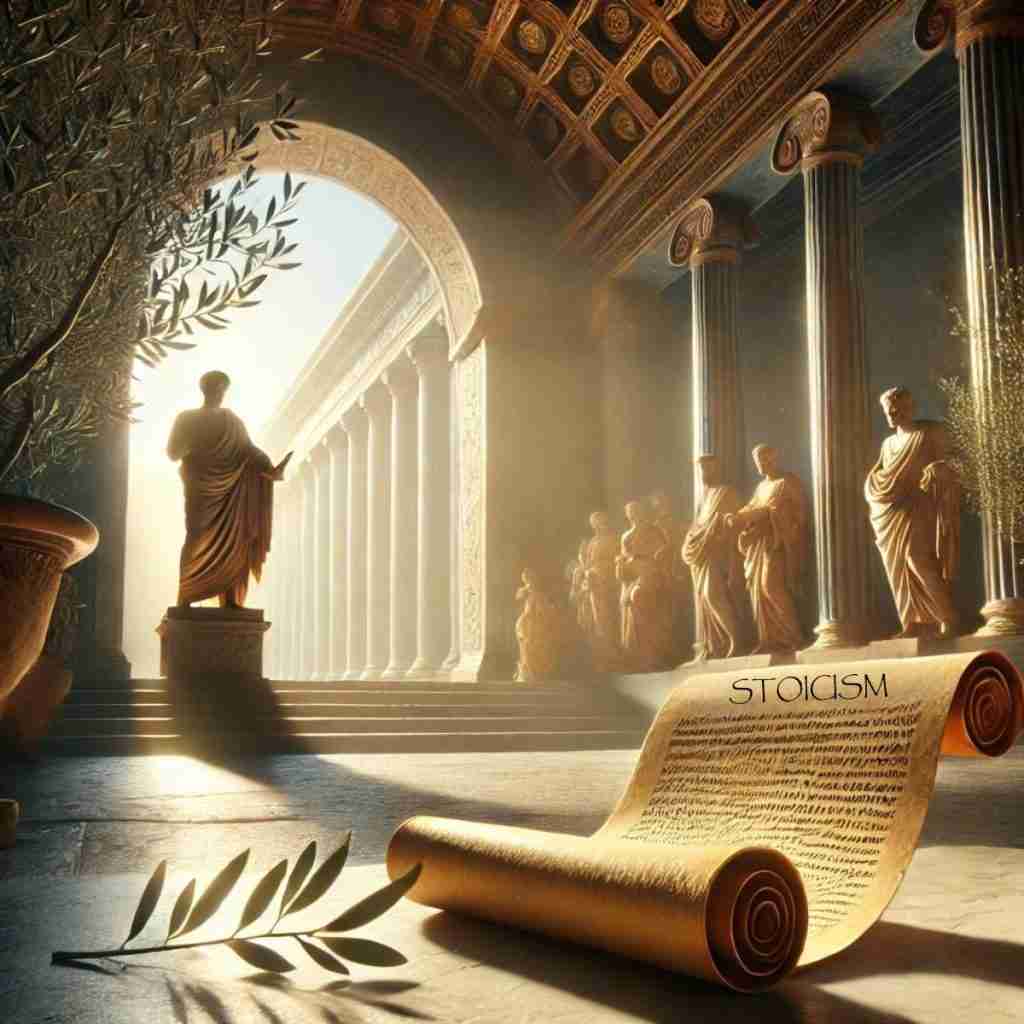In a world often clouded by uncertainty and stress, the wisdom of stoic quotes continues to offer clarity and guidance.
Rooted in ancient philosophy, these powerful sayings are not just relics of the past but timeless principles that speak to our everyday struggles and triumphs.
From managing intense emotions to finding purpose, stoic quotes remind us that the power to lead a fulfilling life lies within our mindset and actions.
So, whether you’re navigating a tough day at work, dealing with personal setbacks, or simply seeking a little perspective, the words of the ancient Stoics have something valuable to offer.
Let’s dive deeper into the philosophy of Stoicism, explore its history, and reflect on the wisdom of some of its greatest thinkers.
What is Stoicism? A Brief History and Philosophy

Stoicism is more than just a philosophy. It’s a way of life.
Founded in Athens by Zeno of Citium in the early 3rd century BCE, Stoicism emerged during a time of significant cultural and political upheaval.
Zeno, after surviving a shipwreck and finding himself in Athens, was drawn to philosophy.
He began teaching his principles under the painted porch, or Stoa Poikile, from which the philosophy takes its name.
At its core, Stoicism teaches the development of self-control, rational thinking, and resilience as tools to overcome destructive emotions.
The Stoics believed that while we can’t always control what happens to us, we can always control how we respond.
One of the most significant contributions of Stoicism is the idea of the dichotomy of control.
This means knowing how to distinguish between things we can influence and things we cannot.
According to the Stoics, true peace comes from focusing on our actions, thoughts, and responses while accepting external events as they are.
Throughout history, prominent figures such as Marcus Aurelius, Seneca, and Epictetus have become synonymous with Stoicism.
Their writings and teachings continue to guide countless people toward inner peace and purposeful living. The resilience and wisdom embodied in their work remain as relevant in today’s modern life as it was two thousand years ago.
Iconic Figures of Stoicism

No exploration of Stoicism would be complete without mentioning its most influential figures:
Zeno of Citium

Zeno of Citium is the esteemed founder of Stoicism. He inspired many with his profound insights.
His teachings laid the groundwork for the stoic philosophy that encourages self-control, rational thinking, and resilience.
Seneca

A Roman statesman and philosopher, Seneca was a prolific writer whose works delved deeply into ethics, emotional resilience, and the art of living a good life.
His letters and essays offer timeless wisdom on how to maintain control over one’s mind and emotions, even amidst the chaos of modern life.
Seneca emphasized the importance of self-control and rational thinking as a means to achieve a state of true happiness.
His teachings remind us that our well-being and the quality of our thoughts are crucial in shaping our experiences and responses to life’s adversities.
Epictetus

Born a slave, Epictetus rose to become one of the most respected philosophers of his time. His teachings emphasized the importance of personal freedom through the mastery of one’s own mind and emotions.
Despite his early life challenges, Epictetus demonstrated that true happiness and well-being are attainable by focusing on what we can control and letting go of what we cannot.
His works continue to inspire those seeking to maintain control over their lives and find peace in the present moment.
They remind us that external circumstances do not define our inner freedom.
Marcus Aurelius

The philosopher-king whose Meditations remains one of the most cherished works of Stoic philosophy, Marcus Aurelius offers profound insights into the human condition.
His reflections, written during his reign as Roman Emperor, serve as a personal guide to living a life of virtue and resilience.
Through his writings, Marcus Aurelius invites us to embrace the challenges of modern life with wisdom and self-control.
He urges us to maintain a firm grasp on our thoughts and actions.
His teachings remind us that true power lies not in external circumstances but in our ability to respond wisely to whatever fate deals us.
These individuals lived their teachings, showing us that Stoicism isn’t just a philosophy to be studied but a guide to be lived.
Now, please enjoy these stoic quotes, and be sure to tell us your favorite one in the comment section!
Stoic Quote on On Resilience and Endurance
Life is rarely smooth sailing, and challenges often come uninvited. The Stoics understood this well and emphasized resilience as one of the key virtues for overcoming adversity. They believed that hardships aren’t inherently negative—they’re opportunities for growth and character development.
What these quotes teach us is that our perception of an event often determines its impact. When we face difficulties with a mindset of growth and resilience, they lose their power to break us. Instead, they become stepping stones to greater strength and wisdom.
So the next time life throws you a curveball, pause and remind yourself: You can’t control the pitch, but you can control your swing.
“Difficulties strengthen the mind, as labor does the body.” — Seneca
“Man is not worried by real problems so much as by his imagined anxieties about real problems.” — Epictetus

“You have power over your mind – not outside events. Realize this, and you will find strength.” — Marcus Aurelius
“I judge you unfortunate because you have never lived through misfortune. You have passed through life without an opponent—no one can ever know what you are capable of, not even you.” – Seneca
On Control and Acceptance
One liberating principle of Stoic teaching is learning to differentiate between what we can and cannot control.
This simple yet profound insight reduces stress and frustration.
Trying to control external events is like trying to stop the tide with your bare hands. Instead, focus on your mindset, your reactions, and your actions.
It’s about letting go of unnecessary worries and embracing life.
“We suffer more often in imagination than in reality.” — Seneca
“How does it help…to make troubles heavier by bemoaning them?” —Seneca
“It is not what happens to you, but how you react to it that matters.” — Epictetus

Acceptance Doesn’t Mean Passivity
It means facing reality as it is and responding in the best way possible.
“Make the best use of what is in your power, and take the rest as it happens.” — Epictetus
“The happiness of your life depends upon the quality of your thoughts.” — Marcus Aurelius
“A bad feeling is a commotion of the mind repugnant to reason, and against nature.” — Zeno of Citium
“If you lay violent hands on me, you’ll have my body, but my mind will remain with Stilpo.” — Zeno of Citium
“Never let the future disturb you. You will meet it, if you have to, with the same weapons of reason which today arm you against the present.” — Marcus Aurelius
“Let us prepare our minds as if we’d come to the very end of life. Let us postpone nothing. Let us balance life’s books each day. . . .The one who puts the finishing touches on their life each day is never short of time.” — Seneca
Stoic Quotes On Virtue and Moral Character
To the Stoics, virtue wasn’t just an abstract concept. It was the foundation of a meaningful life.
They believed that true happiness comes from living in alignment with one’s values and principles.
These quotes encourage us to focus on our actions rather than our words. Being good human beings isn’t about grand gestures. It’s about consistently showing up as our best selves, even in the smallest of moments.
“No man is free who is not master of himself.” — Epictetus
“Man conquers the world by conquering himself.” — Zeno of Citium

“Nothing is more hostile to a firm grasp on knowledge than self-deception.” — Zeno of Citium
“Waste no more time arguing about what a good man should be. Be one.” — Marcus Aurelius
“People are frugal in guarding their personal property; but as soon as it comes to squandering time they are most wasteful of the one thing in which it is right to be stingy.” — Seneca
“If anyone can refute me—show me I’m making a mistake or looking at things from the wrong perspective—I’ll gladly change. It’s the truth I’m after, and the truth never harmed anyone.” — Marcus Aurelius
“If anyone tells you that a certain person speaks ill of you, do not make excuses about what is said of you but answer, ‘He was ignorant of my other faults, else he would have not mentioned these alone.” — Epictetus
On Gratitude and Contentment
In a world that constantly tells us to chase more—more success, more possessions, more status—the Stoics remind us of the power of gratitude and contentment.
Gratitude shifts our focus from what’s missing to what’s already abundant in our lives. It’s not about denying ambition but about balancing it with an appreciation for the present moment.
“You could leave life right now. Let that determine what you do and say and think.” — Marcus Aurelius

“But life is very short and anxious for those who forget the past, neglect the present, and fear the future.” — Seneca
“Very little is needed to make a happy life; it is all within yourself, in your way of thinking.” — Marcus Aurelius
“He is a wise man who does not grieve for the things which he has not, but rejoices for those which he has.” — Epictetus
“Do not spoil what you have by desiring what you have not; remember that what you now have was once among the things you only hoped for.” — Epicurus
Timeless Lessons from Stoic Quotes

The wisdom of Stoic quotes transcends time and cultural boundaries, offering guidance for navigating both personal and professional challenges. By reflecting on the timeless wisdom of these words, we can cultivate resilience, wisdom, and a deeper sense of peace.
Stoicism isn’t about escaping life’s difficulties—it’s about facing them head-on, with courage, clarity, and grace.
Incorporating Stoic principles into your daily life doesn’t require grand gestures. Start small: reflect on a quote each morning. Journal about your reactions to challenging situations, or pause before reacting to anger or frustration.
Over time, these small habits will cultivate a mindset rooted in wisdom, resilience, and gratitude.
Remember, living with integrity means being honest, kind, and just—not because others are watching, but because it’s the right thing to do.
When you master your inner world, the outer world has far less power over you.
Please tell us your favorite Stoic quote in the comment section!
We would love to hear from you.




























Excellent work 👍
Thank you for leaving a comment and we are glad you liked these quotes!